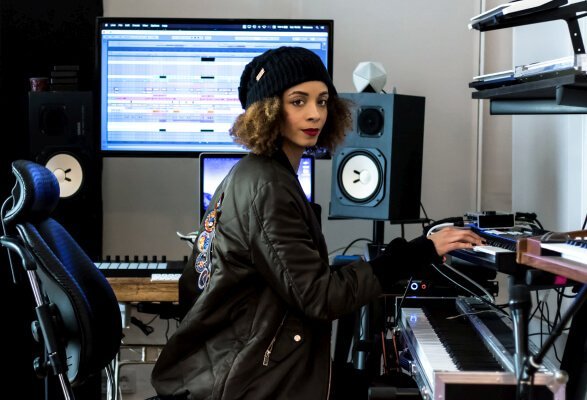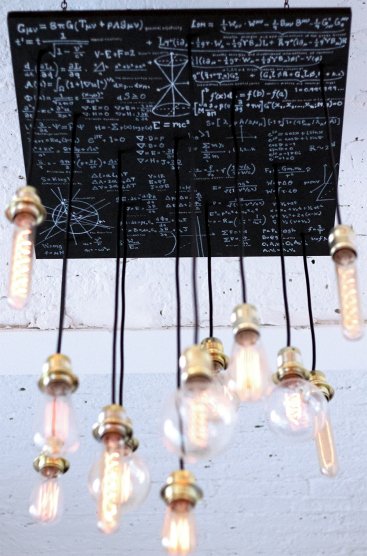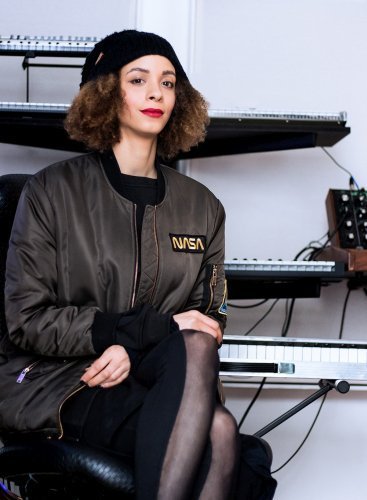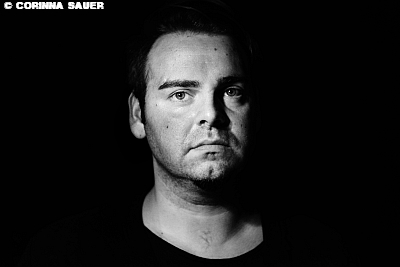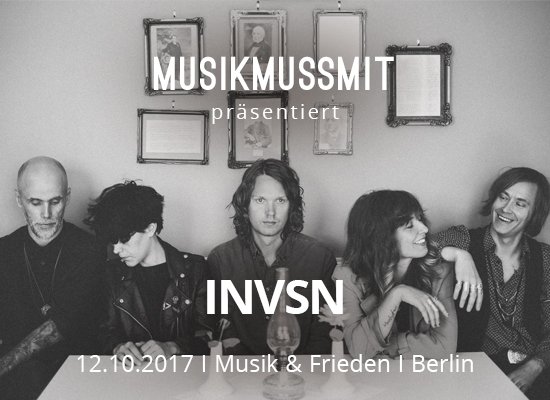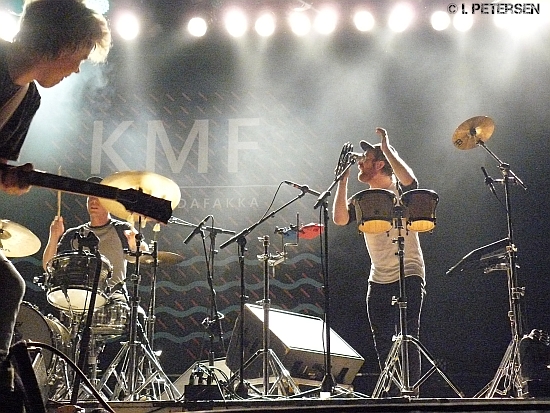Von der Sängerin in L.A. zur professionellen Musikproduzentin in Berlin
***
Text und Foto: Yvonne Hartmann
Der Name Simonne Jones mag einigen noch nicht bekannt sein, dabei mischt die 30 jährige Tausendsasserin aus L.A. schon seit einiger Zeit auch in der Berliner Musikszene mit. Sie spielt mehrere Instrumente, singt, schreibt und produziert, und das nicht nur für sich selbst, sondern mittlerweile auch für deutsche sowie internationale Künstler_innen.
Von einigen Treffen wusste ich, dass sie nicht nur eine außergewöhnlich vielseitige und talentierte Künstlerin, sondern auch eine extrem interessante Persönlichkeit mit vielen Facetten ist. Anlass genug, euch Simonne und ihre Arbeit nicht länger vorzuenthalten.
An einem regnerischen Samstagnachmittag im März empfing sie uns in ihrem gemütlichen Studio in Berlin-Kreuzberg zu einem Plausch. Gitarren an der Wand, ein Piano, diverse MIDI Keyboards, eine Kabine zum Einsingen von Vocals, Bilder vom Mond, mathematische Formeln auf einer Tafel unter der Decke, an der ein paar Vintage-Glühbirnen hängen… Das mit Liebe zum Detail eingerichtete Studio hinterlässt keinen Zweifel: in Simonne’s Leben dreht sich alles um die Musik und die Wissenschaft.
Merkt euch den 4. Mai 2017, denn dann wird Simonne in der Panorama Bar Berlin zu bewundern sein.
***
Im Interview: Simonne Jones
***
Apart from being a musician you are doing so many other things like painting, scientific work, modeling, etc. How would you present yourself?
Well, I would say I’m an artist in the basic sense of the word and my mediums involve science, music, production, engineering, writing…
And would you say that everything is somehow connected, so that inspiration is flowing back and forth between these areas?
Yeah, I would say that. I guess it just depends on how you look at something. If you look at an eyeball, as a scientist you would say it’s a rotating sack of fluid that perceives light information and sends it to your brain through neurons and you do understand the technical aspect of it. But as an artist you might see the eye as something abstract, that involves light, sight and emotion. And both are really accurate depictions of what an eye is, but somehow the combination is a more clear picture of reality than just one or the other. But it’s the same brain that is involved.
What was your inspiration to start making music?
My earliest memories involved music in some sort of way, so I have always been interested in it. I never thought of pursuing it as a profession and make my living just doing music, but then I figured out that it’s actually possible and how to do it. And when I came to Berlin I was really diving into the professional world, but before that I was just playing music out as much as I could with my acoustic guitar. I would play at my university, at coffee houses and just everywhere as much as I could.
On the other hand, during my studies for Bio-Chemical Engineering I took 4 years of recording and engineering classes as an elective part. And I was using ProTools since I was 13 years old. So I always knew how to record my music and I knew all the technical side of how recording and MIDI works, but I never really dove into that. I preferred to stick to my piano, learned to play the guitar when I was 14, started to write songs, but not with the intention of anyone ever hearing them.
So your music career started in the U.S., playing gigs?
Yeah, in Baltimore in the east coast, where I went to university. Nobody knows that, the gigs where you don’t invite anyone, those were my first shows. I would play like twice a week for four years.
I read you taught yourself to play the piano at a very young age?
Yes, I started reading these books for kids that teach you how to play the piano in a playful way and I really learned a lot by just following the instructions and doing the exercises. And then I started listening to music and tried to play what I was listening to. That’s how I learned.
You write, compose, sing, and produce your own music and also build some of your own instruments. Are these complementary steps in the process or do you see them as different areas that provide variety and inspiration? Is there any area you enjoy more?
Oh man, that’s a hard question. I really love performing. That’s probably where I just disappear completely from reality and go to a magical place where anything is possible, it’s this euphoric spiritual experience. But I guess it’s a balance, because I wouldn’t want to do that and not do anything else. You kind of get crazy if you play too many shows back-to-back.
Right now I really enjoy producing for other artists, having them come to my studio with references that aren’t my style. And then I would get my hands dirty in different genres like writing vocals for a man or for somebody that has a crazy vocal range that I wouldn’t normally sing. This year I did around 20 tracks for other artists and different projects. It has been a really intense period of removing my identity from my art and creating something for someone else without any kind of ego and really trying to make their project just as good as it would be if I would be doing it on my own. And I feel that helps my production quality a lot because I really put a lot of care into the artist.
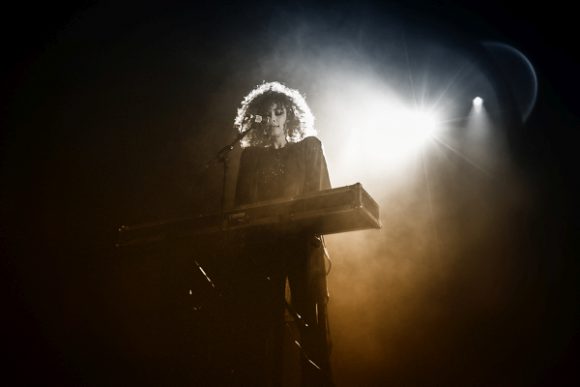
I guess it’s difficult to produce for someone else without letting your own style and preferences influence your work too much?
Yeah, I probably couldn’t do that if I hadn’t a good understanding of the technology that I’m using. When I first started I had this Pandora’s Box of material, like the Native Instruments stuff. Knowing what you have for example in KOMPLETE alone is just insane. So it took me probably a good two years to be able to emulate any sound that I hear. So now when somebody comes in and says “I want something that sounds like this…” then I can do that immediately. And that helps a lot, because otherwise I would be limited to my own sound and I wouldn’t be able to flip genres. So now I’m doing productions from Hip Hop tracks to really airy, beautiful, almost like Indie-Icelandic tracks, to acoustic stuff, to dance music, to pop music. I’m definitely finding that there is so much to learn with all of this.
You’re originally from L.A. and came to Berlin 6 years ago, following the call of Peaches with whom you’ve worked in the past. How different is Berlin’s music scene for upcoming artists compared to L.A.? Is it easier, harder or just different?
I can’t really speak about the music industry as a whole, but I can speak on my personal experience as somebody who is born in Hollywood and moved to Berlin. I’m signed to a major label, what would be good in either place, but I think it’s difficult wherever you are in the world. It feels like there is an illusion about where you are is affecting your career, I think that’s only if it inspires you negatively. If you were like in Cambodia working on a masterpiece and put it online, in 2017 millions of people could hear that. So more and more it really doesn’t matter where you are as long as you are just creating something that you love and putting your heart and your everything into that… and then it’s gonna be difficult wherever you are, haha!
So L.A. for whatever reason, maybe for others is the most inspiring place in the world where they can create their masterpiece. But for me I found that I was saturated not with a lot of art but with a lot of hype and it was very challenging to create art in a free open space and have people appreciate that process and not judge it. Berlin is perfect for that, as you can play anywhere you want, like in a club for example. In L.A., if you want to play in a music venue you have to pay the venue for it. You can’t go into a club or a bar and just freeform.
People here just perform in the streets, or they create kinetic sculptures, etc. You cannot do that in L.A., because you get fined. It’s just a different vibe. But it has its cool parts and there are a lot of professional writers. I definitely spent a couple of months there when I was writing my album because some producers and writers that I really like are there and I could work with a bunch of people at once. But I don’t think that has to do with L.A. per se.
What are your favorite locations for gigs in Berlin?
Definitely Berghain, it has a Function-One sound system which is designed for that room, so you get a full-body experience. I’m really looking forward to performing there in May. And I have been DJing a lot in Berlin in very random places. The last DJ gig I had was at Schwuz. I like that place in particular because it’s super inclusive. It’s the opposite of Berghain in a way, the vibes there are really special. There are just all kinds of shapes, sizes, colors, ages, it’s so chilled. And they also let in refugees for free, which is cool.
As we mentioned earlier, you work really closely with Peaches but you also had projects with Jean-Michel Jarre or the Frankfurter ORSO Orchestra, for example. How important are collaborations with other artists for the development of your own music?
It definitely expands my mind. The first musical release that I had was the Free Pussy Right song that I made with Peaches. So she just called me up and asked me “Do you wanna write a song called Free Pussy Right about the performance artists in Russia?” And I said yes, and she was like “OK, I wanna do this on the weekend and shoot the video on Monday.” So the next four days we wrote, produced, mixed, mastered and shot a video for it. She has been a real advocate in terms of making sure that I’m an independent, strong, female producer. Because I have the technical background at this point to do any kind of production work I can imagine, and to have that and not use it is a waste in a sense. I also like that I don’t have to be dependent on someone else to fulfill my creative art from its inception until its end, and that’s what made me a better artist.
Peaches kind of forced me to do that, she literally locked me into her studio and was like “Go in there and play around with my modulars, synthesizers and scream in this room and produce music!” At the time I was just focusing on my performances, playing acoustic guitar and not really using my full potential as a producer. So I started producing, I stopped using ProTools and moved to Logic and then to Ableton, because I’m all about cranking out really fast productions and getting the idea down and not so much worrying about the tiny details about editing and micro editing.
The Jean-Michel Jarre project was very random. After I got featured as a producer on the Ableton website he called me up and invited me to fly to a country of my choice to research dying languages for a reincarnation of his Zoolook album. And so I picked Brazil, because I could work with an indigenous tribe there. I’m also native American and was super interested in going to the Amazon and talking about the universe.
That sounds like a really intense experience.
Yeah, collaboration is very important. Even for my record I took so many sessions with other artists for inspiration and just getting outside of your own thinking. And taking those sessions and their outcome and producing them on my own was also really important.
Also in terms of workflow apart from the musical inspiration?
Yes, I tend to do both. Some artists kind of shy away from collaboration for like the purity of their space which I can totally understand. I think it’s really important to be alone and to allow your ideas the time to flourish alone, that’s really essential for the creative process. But there’s no reason why you can’t do both at the same time. I mean you can be alone anytime you want, so I found it really helpful to both collaborate as much as I could and then be alone as much as I could.
Having had a bunch of interesting projects and collaborations, it hasn’t been until May 2016 that you released your own material with your first single „Gravity“, which seems like a scientific translation of a love story. Is your scientific background an important source of inspiration for you as a musician?
Definitely! I studied Biochemical Research which includes Biochemical Engineering, Biology and Genetics with a medical application. And before I started studying I was thinking about what to do. So I went on this 2-year-project as an undergraduate, working with delinquent youths in the inter cities. It was a research project with the baddest of the baddest kids, giving them treatment in their environment instead of sending them to state detention centers, and then testing the effect of that kind of therapy. That was really interesting, because you go into these rough neighborhoods and you’re talking to a 14-year-old girl who just had a baby and is living with a mom who had eight kids from like six different dads.
But then I decided that I wanted to do something more medically based and that was when I switched. I started working in a hospital in the surgical E.R. as a blood runner basically, learning about medical practices which was also intense, because Baltimore is just rough. It’s definitely as bad as one would imagine, with gang fights, stabbings and gunshots and all sorts of drug related illnesses. But I loved working there and at that point I realized that I loved science.
***
Sie sehen gerade einen Platzhalterinhalt von Youtube. Um auf den eigentlichen Inhalt zuzugreifen, klicken Sie auf die Schaltfläche unten. Bitte beachten Sie, dass dabei Daten an Drittanbieter weitergegeben werden.
***
Did that experience influence your life and your music in a way?
It influenced the way that I see the world. I kind of approach problems as I have been trained to like a scientist.
And I guess it also made you see the human part in science?
Yeah, actually that’s a really good point! One thing I really like about music is that it’s like medicine for the soul. It’s scientific in a technical sense but it penetrates humanity and has the potential to make people happier and healthier. So yeah, I guess that’s the unifying theme.
You are also building your own instruments, is that also related to your love for science and engineering?
Probably yeah, I definitely like to really understand how things work in general. But I don’t think I really got interested in DIY Electronics until I came to Berlin. I think it has to do with this tactile artistic side of me, because I also paint and I build sculptures, so it kind of makes sense to make an instrument. I guess this combination in Berlin turns into like “hey let’s make a synthesizer” and I would go to a friend’s house and make MIDI triggers, plug it into a MIDI interface, connect it to Ableton and trigger like monkey sounds.
You mentioned an album before. Can we expect it to be released soon?
Yeah, I’m going to put out a first single of that record very soon. I haven’t had a formal release of anything yet, Gravity was just like a teaser or introduction track. It makes you curious of where it is going, if it’s going to be more pop-influenced or if it will be a little darker.
I’m already looking forward to hearing the whole album. Thanks a lot for this really interesting afternoon!
***
Simonne Jones live!
***
Wer Simonne live erleben möchte, sollte sich jetzt schon eine Karte für A Partial Eclipse of the Heart am 4. Mai 2017 reservieren. Your Mom’s Agency bringt über 30 interdisziplinäre Künstler_innen aus verschiedenen Bereichen und ihre Interpretation von Drone Techno, Synthpop, digitalen Bildern, Licht und Schatten ins Berghain.

